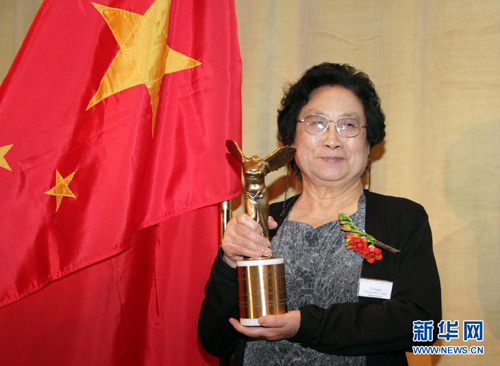"Using qinghao to treat malaria was in fact recorded in the Manual of Clinical Practice and Emergency Remedies by Ge Hong of the East Jin Dynasty in 340 AD," Tu explained.
She then redesigned the extraction process and applied ether to isolate the active, potent ingredient. By perfecting the techniques, Tu eventually achieved dramatic success in 1971 after 190 failures.
"The application of ether in extraction played a key role in finding the antimalarial ingredient in sweet wormwood and conducting further studies on it," commented Li Guoqiao, a professor at Guangzhou University of Chinese Medicine.
"Tu is even qualified for a Nobel Prize," added Rao Yi, professor at Peking University, "since qinghaosu has stood the test of time and saved many lives."
However, as the saying goes: Tall trees catch much wind. Even as she enjoyed much praise, the "Mother of Artemisinin" was challenged by many researchers.
Though artemisinin has been widely accepted and used, Tu has long been a controversial figure, especially when she made the headlines in September. She was even accused of never successfully extracting the ingredient from sweet wormwood.
When commenting on one of Tu's books, Li Ying, a researcher at the Shanghai Institute of Materia Medica of the Chinese Academy of Sciences, criticized it, saying, "A large part of the book distorts history and ignores reality, which has misled readers seriously, caused an evil influence and should be exposed."
Li argued that even though Tu had proven that sweet wormwood is effective in curing malaria, it was hard to conclude that she had actually discovered artemisinin.
"Tu indeed fired the ardor of researchers in studying sweet wormwood. In 1973, the Yunnan Institute of Materia Medica and Shandong Institute of Parasitic Diseases also successfully isolated an active compound from artemisia annua and later officially named it artemisinin," added Li.
However, Tu's ingredient reportedly ran a bad clinical trial and caused toxic side-effects, while the findings of the institutes in Yunnan and Shandong were tested as effective antimalarials.
Professor Li Guoqiao also pointed out that many have claimed to find artemisinin, which is one of the seven compounds extracted from sweet wormwood. But only the one that works in clinical trials can be called artemisinin.
He stressed that the institutes used a different method than Tu for extraction, choosing organic solvents like naphtha instead of ether.
Tu responded that she does not like to be bogged down in endless debates, and that her book was completely based on facts.


















